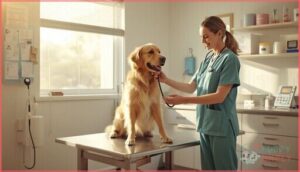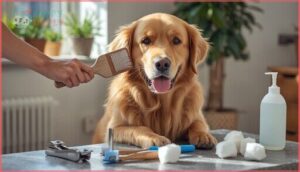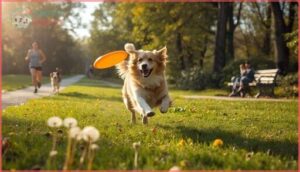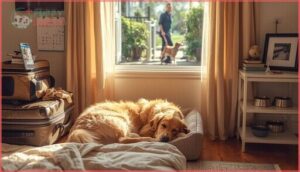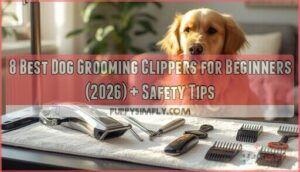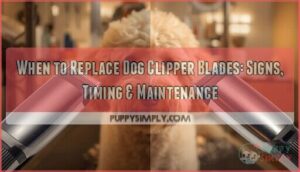This site is supported by our readers. We may earn a commission, at no cost to you, if you purchase through links.
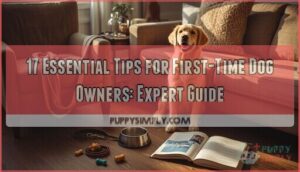
Your first dog will change your life, but without the right foundation, even the best intentions can lead to frustration for both of you. Over 3.3 million dogs enter shelters each year, and many arrive because their owners weren’t prepared for the realities of canine care.
The good news is that success doesn’t require flawlessness—it requires understanding a few key principles that experienced dog owners wish they’d known from day one. From establishing leadership and creating a safe home to mastering training basics and prioritizing health, these 17 tips for first-time dog owners will help you build a strong bond with your new companion while avoiding the most common pitfalls that trip up beginners.
Table Of Contents
- Key Takeaways
- The Importance of Being a Responsible Dog Owner
- Establishing Yourself as The Pack Leader
- Creating a Safe and Comfortable Home Environment
- The Basics of Dog Training and Discipline
- Understanding and Communicating With Your Dog
- The Importance of Regular Vet Visits
- Proper Nutrition and Feeding for Your Dog
- Grooming and Taking Care of Your Dog’s Physical Needs
- The Importance of Exercise and Playtime
- Planning for Holidays and Time Away From Your Dog
- Frequently Asked Questions (FAQs)
- How do I know if a dog is the right breed for me?
- What should I do if my dog has an accident in the house?
- How do I manage my dog’s energy levels?
- How do I know if my dog is in pain?
- How can I tell if my dog is feeling anxious?
- What vaccinations does my puppy need and when?
- How do I choose the right veterinarian?
- Should I spay or neuter my dog?
- What supplies do I need before bringing home?
- How much does dog ownership cost annually?
- Conclusion
Key Takeaways
- Establishing yourself as a calm, confident pack leader from day one through consistent commands and clear boundaries prevents up to 40% of first-year behavioral problems and builds the trust your dog needs to thrive.
- Proper preparation means dogproofing your home room by room, budgeting $2,500-$4,000 annually for care, and committing to regular vet visits that catch 90% of health issues early when treatment works best.
- Daily exercise matched to your dog’s breed and age—ranging from 15 minutes for puppies to over two hours for high-energy breeds—prevents obesity, reduces anxiety, and strengthens your bond while keeping you both healthier.
- Success comes from positive reinforcement training during short daily sessions, reading your dog’s body language to understand their stress signals, and maintaining consistent routines for feeding, grooming, and care throughout their 10-15 year lifespan.
The Importance of Being a Responsible Dog Owner
Responsibility is the cornerstone of dog ownership, shaping everything from your dog’s health to your community’s well-being. When you bring a dog home, you’re committing to their care for 10 to 15 years. Responsible dog owners comply with legal requirements like licensing and microchipping at rates exceeding 92%, while also budgeting $2,500 to $4,000 annually for proper care.
Your choices directly impact public safety, animal welfare, and community harmony. First-time dog owners who embrace these responsibilities see healthier, happier dogs and stronger neighborhood ties, making responsible dog ownership a win for everyone involved.
Some states, like Colorado, have exceptionally high commitment scores due to their pet-friendly environments.
Establishing Yourself as The Pack Leader
Once you’ve committed to caring for your dog long-term, the next step is establishing pack dynamics. Your dog naturally looks for a pack leader, and you need to fill that role with calm confidence. When you set clear rules from day one, 85% of multi-dog households experience less stress, and you’ll see 40% fewer behavioral problems in your first year together.
Here’s how to become a confident pack leader:
- Use consistent commands during daily training sessions to improve obedience by 65%
- Set firm boundaries early, reducing jumping behaviors by 55% within weeks
- Maintain calm-assertive body language that lowers your dog’s anxiety by 75%
- Establish fixed feeding schedules to reinforce your leadership role naturally
- Lead walks confidently to decrease leash-pulling by 50%
Command consistency and boundary setting work together to build trust and respect.
Creating a Safe and Comfortable Home Environment
After building that pack leader foundation, your next job is preparing your home environment for your dog’s arrival. Dog safety starts with thorough hazard prevention—securing electrical cords, storing cleaning supplies out of reach, and removing toxic plants that could harm your curious companion.
Creating safe zones gives your dog a retreat where they can relax without constant supervision. Use baby gates to block off restricted areas and set up a comfortable resting spot with orthopedic bedding that bolsters their joints. For homes with yards, verify fences are secure and avoid lawn pesticides that expose your dog to harmful chemicals. It’s also important to schedule a visit for essential veterinary care upon bringing your dog home.
Space needs vary by breed, but every dog deserves room to stretch out comfortably. Comfort essentials like waterproof blankets and appropriately sized crates back rest and reduce anxiety during adjustment periods.
| Room-by-Room Dogproofing | Primary Hazards | Quick Solutions |
|---|---|---|
| Kitchen | Trash, cleaning products, small objects | Secure cabinets, use lidded bins |
| Living Room | Electrical cords, toxic plants, shoes | Cord protectors, baby gates |
| Bathroom | Chemicals, open toilets, medications | Keep lids closed, lock cabinets |
| Yard | Unsecured fences, pesticides, sharp tools | Inspect weekly, use pet-safe products |
The Basics of Dog Training and Discipline
Your home is ready—now it’s time to guide your dog’s behavior through effective training and discipline. Dog obedience starts with positive reinforcement: rewarding good actions immediately with treats, praise, or play. Research shows dogs trained with rewards learn faster and show fewer stress behaviors than those facing aversive methods like harsh corrections or yelling.
Effective dog training begins with positive reinforcement—rewarding good behavior immediately creates faster learning and less stress than harsh corrections
Start early training during the critical socialization window between 3 and 14 weeks, when puppies absorb new experiences most easily. Focus on basics of dog training—sit, stay, come—using clear, consistent commands. Dog behavior and training improve dramatically when you practice daily in short five-minute sessions rather than occasional marathon efforts.
Avoid leash jerks or shouting; these dog training and discipline approaches increase anxiety without improving learning speed. Instead, redirect unwanted behaviors and immediately reward the correct choice. Owner practices matter: consistency beats being faultless, and patience builds the trust your dog needs to thrive.
Understanding and Communicating With Your Dog
When your dog blinks frequently during a hug or licks their nose while you’re petting them, they’re signaling stress—not affection. Understanding and communicating with your dog starts with reading body language, scent signals, and vocalizations that reveal what they’re feeling. Research shows mutual gazing actually raises oxytocin levels in both you and your pup, strengthening your bond. Dogs also excel at gesture comprehension, following your pointing cues to find hidden treats.
To decode dog communication and behavioral cues effectively:
- Watch for stress signals like yawning, lip-licking, or turning their head away during close contact.
- Notice when your dog stares directly at you—it happens less often than you’d think but signals focused attention.
- Pay attention to whines versus barks; each vocalization conveys different emotions and needs.
- Observe how your dog investigates scent marks on walks—they’re reading detailed messages about other animals’ health and status.
The Importance of Regular Vet Visits
Beyond the routine shots and flea treatments, regular vet visits serve as your dog’s safety net against hidden health problems. Puppies need check-ups every three to four weeks until about 16 weeks old for vaccination schedules and development tracking. Adult dogs benefit from at least one annual exam, while senior pups (seven years and older) should see the veterinarian twice yearly.
Here’s why preventative care matters: 90% of health issues caught during wellness exams are detected early, when treatment works best. Early detection of problems like heart disease, dental issues, or diabetes can cut your long-term costs by up to 50% compared to emergency care.
Most dog owners comply with core vaccines, but only 35% follow through with recommended senior screenings—don’t let cost concerns delay your pet’s veterinary care.
Proper Nutrition and Feeding for Your Dog
As a vet, I’ve seen how choosing the right food transforms a dog’s health. Your pup’s dietary needs depend on age, size, and activity level—puppies need at least 22.5% protein for growth, while adults thrive on 18%.
Look for quality dog food labeled “complete and balanced” to meet these standards. Portion control matters too; about 65% of adult dogs are overweight from overfeeding.
Feed adults twice daily, puppies three to four times, and monitor your dog’s body condition regularly. Proper nutrition isn’t complicated—it’s about consistency and attention.
Grooming and Taking Care of Your Dog’s Physical Needs
Maintaining proper grooming isn’t just about keeping your dog looking sharp—it’s essential for preventing serious health issues. Regular coat maintenance, nail care, ear cleaning, and dental hygiene form the foundation of your pup’s physical well-being.
Grooming and taking care of your dog should include:
- Coat Maintenance: Brush short-haired breeds weekly, long-haired types several times weekly. Bathe every 1–6 weeks depending on coat type.
- Nail Care: Trim every 3–4 weeks to prevent joint stress and mobility problems.
- Ear Cleaning: Check floppy ears frequently; use cotton balls during baths to keep water out.
- Dental Hygiene: Brush teeth regularly, since periodontal disease affects most adult dogs.
Grooming needs vary by breed, but parasite control and routine dog grooming are musts for everyone.
The Importance of Exercise and Playtime
Think of regular activity as your dog’s daily medicine—without it, both body and mind suffer. Over 50% of U.S. dogs are overweight or obese, and the fix isn’t complicated: consistent exercise paired with engaging play keeps your pup physically fit and mentally sharp.
Exercise benefits extend beyond weight control. Dogs exercised less than once daily face nearly twice the risk of becoming overweight, while under-exercised pups show 1.58 times higher fearfulness and increased destructive behaviors like excessive barking or chewing.
Your dog’s energy levels depend heavily on breed needs and life stage:
| Breed Type | Duration | Frequency |
|---|---|---|
| Border Collies | 2+ hours | Daily |
| German Shepherds | 1.5–2 hours | Daily |
| High-energy breeds | 30–45 minutes | 2–3 times daily |
| Puppies | 15–30 minutes | 1–2 times daily |
| Senior dogs | 10–20 minutes | 2–3 times daily |
Mental stimulation through playtime activities—puzzle toys, training games, interactive play—releases dopamine and strengthens problem-solving skills. The importance of exercise and playtime creates owner synergies too: dog walkers achieve 2.74 times higher likelihood of meeting weekly activity goals. When you move together, you both thrive.
Planning for Holidays and Time Away From Your Dog
Leaving your dog behind can feel like leaving a piece of yourself, but with careful Holiday Planning, you’ll both manage just fine. Most adult dogs handle 4–6 hours alone, yet around 20% experience Separation Anxiety—watch for destructive chewing or excessive barking.
For longer trips, explore Boarding Alternatives: nearly half of pet owners rely on family or friends, while 21% hire in-home Sitter Options. Doggy daycare and Boarding Kennel facilities offer structured care.
Remote Monitoring tools like pet cameras let you check in anytime. Line up a trusted dog walker for daily visits and make sure Getting backup support is always ready.
Frequently Asked Questions (FAQs)
How do I know if a dog is the right breed for me?
Choosing the perfect dog breed is life-changing. Research breed traits, lifestyle compatibility, and temperament carefully.
High-energy breeds need vigorous daily exercise, while sedentary types thrive with lighter activity. Match your routine to your dog’s needs for lasting success.
What should I do if my dog has an accident in the house?
Stay calm and avoid punishment. Blot the accident immediately, then use enzymatic cleaners for complete odor elimination and stain removal.
Address training regression by increasing potty breaks and rewarding outdoor success.
How do I manage my dog’s energy levels?
Managing dogs’ energy levels isn’t rocket science—just daily exercise (30 minutes minimum for most breeds), mental enrichment through puzzle toys, and 12–16 hours of sleep to keep your pup balanced and happy.
How do I know if my dog is in pain?
Dogs often mask discomfort, so watch for behavioral changes like withdrawal, irritability, or reduced activity.
Physical signs include limping, panting at rest, and appetite loss. Vocal patterns—whimpering or yelping—signal pain.
Veterinary assessment ensures accurate diagnosis and appropriate care for your dog’s wellbeing.
How can I tell if my dog is feeling anxious?
Your dog’s body language tells the real story—watch for pacing, excessive panting, trembling, or hiding.
Some anxious dogs bark more, chew furniture, or seek constant contact, signaling they need your reassurance and support.
What vaccinations does my puppy need and when?
Your puppy needs core vaccines—distemper, parvovirus, adenovirus—starting at six to eight weeks, then every two to four weeks until sixteen weeks.
Rabies follows around twelve weeks, with booster schedules based on regional differences and immunity timeline considerations.
How do I choose the right veterinarian?
Picture yourself walking through clinic doors, knowing your dog’s in good hands. Look for vet qualifications, nearby clinic accessibility, extensive service offerings, transparent payment options, and a warm communication style that makes veterinary visits feel like partnership, not pressure.
Should I spay or neuter my dog?
Spaying or neutering affects your dog’s health impacts, behavioral changes, and population control.
Timing considerations and individualized decisions matter, so discuss breed, age, and veterinary visits with your veterinarian for individual dog health care recommendations.
What supplies do I need before bringing home?
Before your new companion arrives, gather essential supplies: a comfortable bed, quality food and water bowls, a properly sized crate for training, identification tags, age-appropriate toys, and basic grooming tools to help with a smooth start at home.
How much does dog ownership cost annually?
Dog ownership budget varies widely—from $1,000 to $5,225 annually—depending on veterinary care, food costs, insurance premiums, grooming costs, and hidden fees.
First-time dog owners should expect veterinary expenses, pet food, and routine care to dominate spending.
Conclusion
Like the bond between Old Yeller and his family, your relationship with your dog will deepen through patience, consistency, and care. These 17 tips for first-time dog owners aren’t just guidelines—they’re the foundation for years of loyalty and companionship.
You’ll make mistakes along the way, and that’s perfectly normal. What matters most is your commitment to learning, adapting, and meeting your dog’s needs with compassion.
The journey starts now, and it’s worth every step.
- https://www.forbes.com/advisor/pet-insurance/pet-ownership-statistics/
- https://www.petfoodindustry.com/pet-ownership-statistics/article/15747936/chart-cats-and-dogs-lead-us-pet-ownership-growth-20232025
- https://www.mygoldenretrieverpuppies.com/blog/pet-ownership-statistics
- https://commercial.yougov.com/rs/464-VHH-988/images/2023-05-YouGov-US-Dog-Owners-Report.pdf
- https://www.carecredit.com/pressrelease/synchrony-2025-pet-lifetime-of-care-study/




